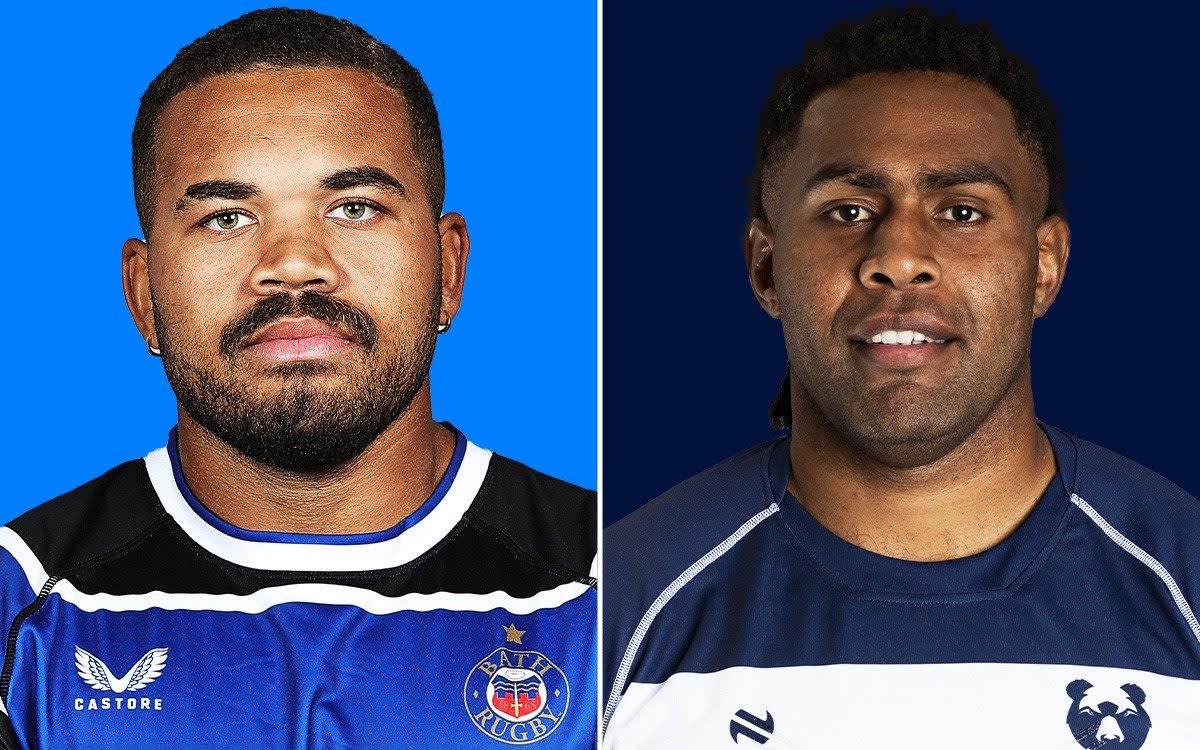
Nothing is as constant as change in English rugby union and this season will see a much-debated tweak to the salary cap regulations.
Despite vocal opposition to it, and a competitive and compelling 2023-24 campaign resulting from the lower wage ceiling that was imposed the aftermath of Covid, the maximum level of the Premiership cap has risen from £5m to £6.4m.
There will be an additional £600,000 (up to £50,000 per player) available in ‘home grown player credits’, with another £400,000 (up to £80,000 per player) to cover England call-ups. Clubs have injury dispensations worth £400,000 and can have the salary of one player – or two if both players have existing contracts from June 2020 – excluded from the cap entirely.
Among several sources in various roles around the game, the consensus was that all but three or four Premiership sides will be working to their own budgets rather than pushing up against the maximum. Those clubs have devoted considerable funds to retaining important players.
In the second year of a 10-team top tier, squads have generally slimmed down. Negotiations over the professional game partnership (PGP) have, though, added a degree of uncertainty about aspects such as hybrid contracts (or enhanced contracts, to use their official name) and whether certain individuals will net an additional £160,000 or so for England commitments.
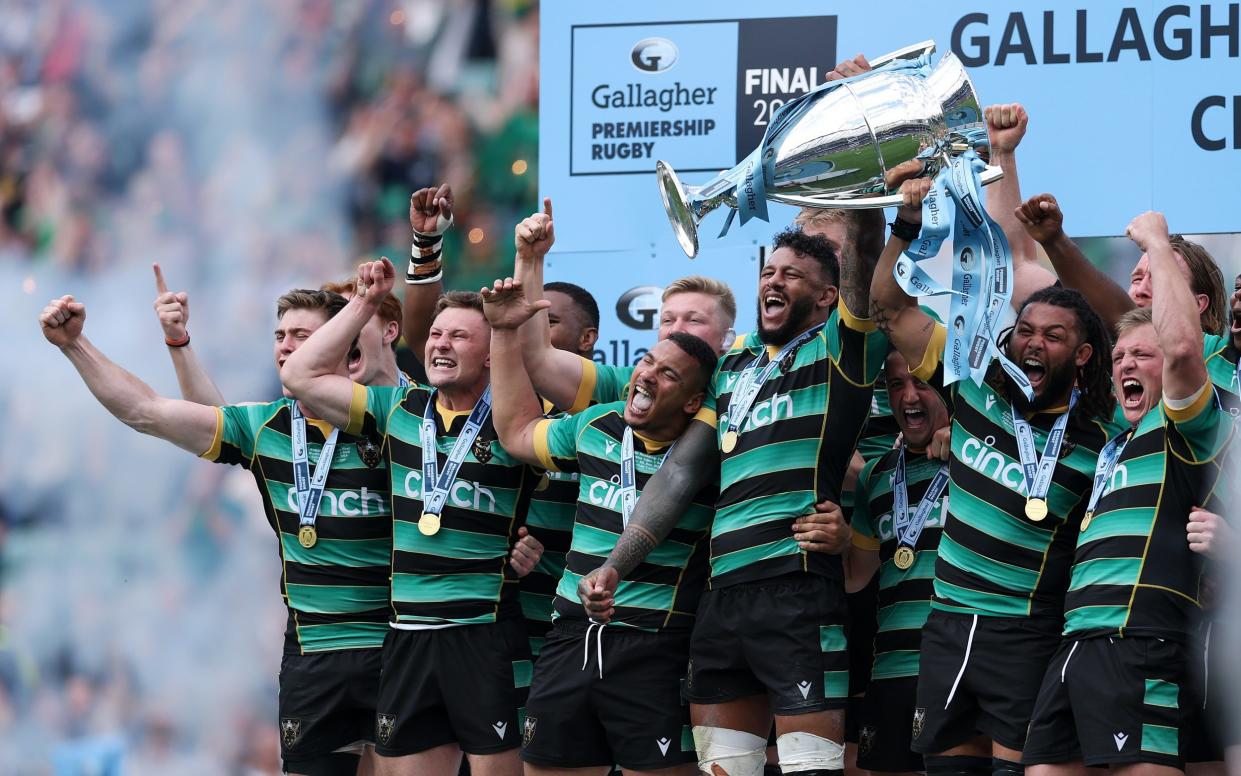
Recruiters have backed themselves to identify prospects from university teams, in lower leagues and national age-grade sides around the world. One way of viewing this is that clubs are trusting their coaches to polish youngsters. Another, less diplomatic source joked that “everyone is hoping they can shop at Lidl and get away with it”.
Then again, keeping back cap space may prove prudent. Jack Willis, Ben Loader, Dan Robson, Junior Kpoku and others could return to these shores from France if the price is right.
Signings from Argentina and Wales continue to be popular and there appears to have been an onus on making full use of the academy salary cap, which allows for a total of £100,000 – but no more than £50,000 per player – to be spent on non-homegrown additions under the age of 24. Homegrown players do not count against the academy cap, and clubs must pay compensation if they approach and acquire youngsters developed by rivals.
Interrogating spend in professional sport contextualises performance by showing who is underachieving and who is punching above their weight. Of course, it could be that the valuation of players is simply out of whack. Either way, there is accountability. With that in mind, here is our club-by-club run-down ahead of the 2024-25 Premiership season. In part one, we assess Bath, Bristol Bears, Exeter Chiefs, Gloucester and Harlequins.
Bath
Excluded player: Finn Russell
There is a feeling that a bloated wage bill is gradually being “smoothed out” at Bath as Rob Burgess, their head of recruitment, “unpicks” the situation he walked into a year ago.
Suggestions of ‘back-loading’ contracts have persisted, and openside flanker Guy Pepper is thought to have been acquired from Newcastle Falcons on an agreement worth close to £500,000 over three seasons. Crucially, the first year of this will only see between £40,000 and £50,000 count against the academy cap.
Kepu Tuipulotu, the England U18 hooker who was previously at London Irish, and Tyler Offiah, son of Martin, are two even younger recruits. James Linegar, a highly promising 17-year-old fly-half who toured with England Under-18, has been granted a first professional deal.
One source explained that Bath have become shrewder at “locking kids into long-term deals”. A wider trend of Premiership recruitment is aligning contracts with the length of degree courses, and nearby Bath University provides scope for this practice.
Finn Russell, picking up a hefty salary of £750,000, is the excluded player for a second year. Ted Hill, Alfie Barbeary and Ollie Lawrence are understood to be taking up a combined total of around £1m of cap space. Lawrence is out of contract at the end of this season. At a club like Bath, retention has to be relentless.
Sam Underhill, Cameron Redpath, Max Ojomoh, Charlie Ewels, Josh Bayliss, Tom de Glanville, Miles Reid, Niall Annett, Will Muir, Archie Griffin and Joe Cokanasiga were all renewed last year. Elliott Stooke, initially obtained with injury dispensation, was not offered a satisfactory sum. He headed to Japan with Red Hurricanes Osaka.
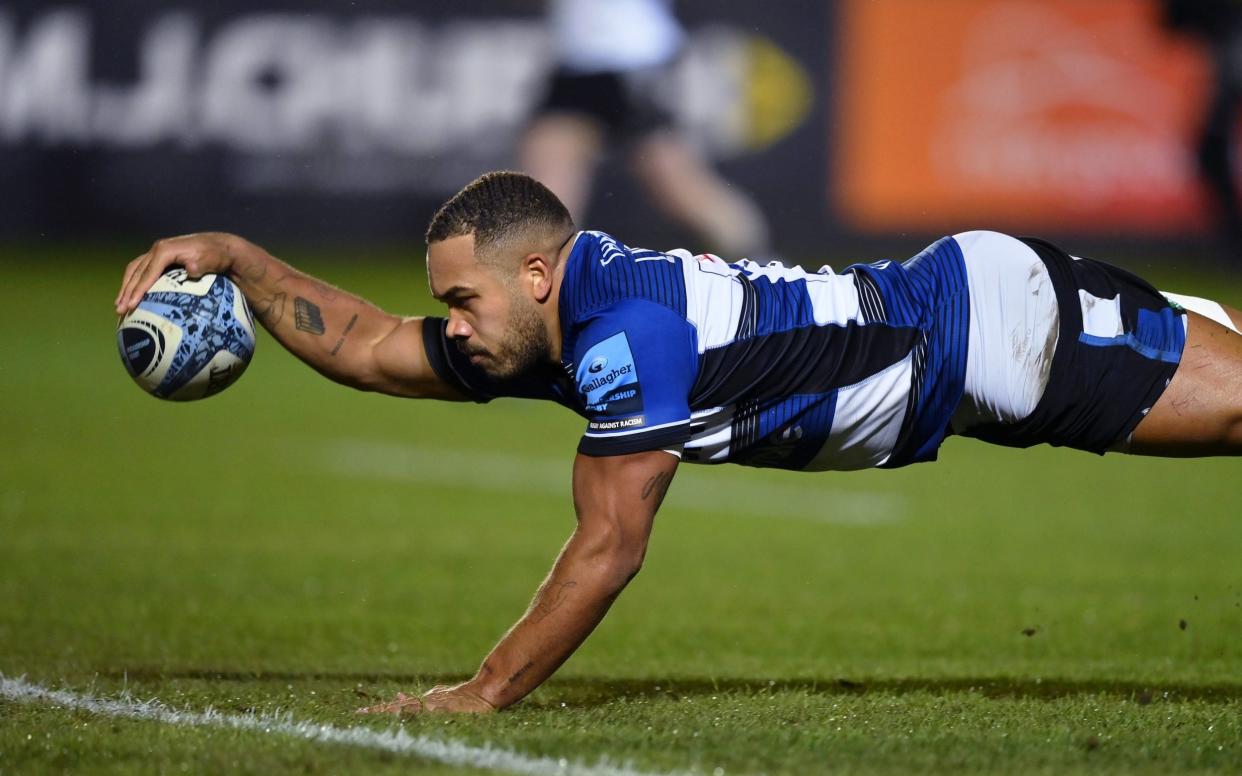
Indeed, there was more movement among a sizeable stable of back-five forwards. Chris Cloete and GJ van Velze both retired and Josh McNally went to Cardiff. Ross Molony, meanwhile, was signed from Leinster on around £250,000 – more than was on the table for him in Dublin. Interestingly, Alex Coles and Rus Tuima were looked at before they committed to Northampton Saints and Exeter Chiefs, respectively.
The versatility of Thomas du Toit, capable of covering loosehead as well as tighthead prop, enhances his value. Francois van Wyk is a reliable back-up on the loosehead side, with lock Jacques du Plessis and Neil le Roux, a former Baby Boks scrum-half, two more South Africa additions. Code-hopper Regan Grace, thought to be earning in the region of £100,000, seems to be a wildcard.
Ben Spencer and Beno Obano, two influential front-liners, will have to be extended ahead of next season. The former seems particularly important to Johann van Graan’s project, if not quite as critical as Russell.
A subplot to monitor is Bath’s pursuit of a hooker. Annett, Tom Dunn and Hame Faiva are all over 30. Tuipulotu, in his teens, will need time. Up the road at Bristol Bears, former Bath academy boy Gabriel Oghre will be out of contract.
Biggest strength: Russell earning every penny with a loaded pack
Biggest headache on the horizon: Spending too long in the season without Russell

Bristol Bears
Excluded player: Ellis Genge or AJ MacGinty
The message echoing out of Ashton Gate is clear: Bristol have cut their cloth and readjusted. “It does feel like they’re moving out of the Galactico era, for sure,” agreed one source.
Pat Lam told Telegraph Sport that the senior squad has been streamlined from 48 players to 36, a process encouraged by the shorter league schedule. “There was a lot of space in our team room at the start of pre-season,” he said. “The young guys can look up and know they are the next cab off the rank”.
Gethin Watts, the head of recruitment at Bristol, is understood to have been charged with bringing in rough diamonds that are “as cheap as possible”. There is excitement about Benjamin Elizalde, the Argentina Under-20 full-back. He is thought to have turned down a weightier offer in the Championship to become a Bear.
Sam Edwards and Jacob Cusick, two former Leicester Tigers, have also been given a shot. Kofi Cripps, the ex-England U20 flanker who has arrived via the Wasps academy and Clifton in the fourth tier, is another hungry bolter.
There are clear examples of recalibration elsewhere. Kyle Sinckler, said to have been earning around £550,000 at one stage, has left for Toulon. Lovejoy Chawatama, being paid roughly a third of that, comes in from Harlequins as a tighthead candidate.
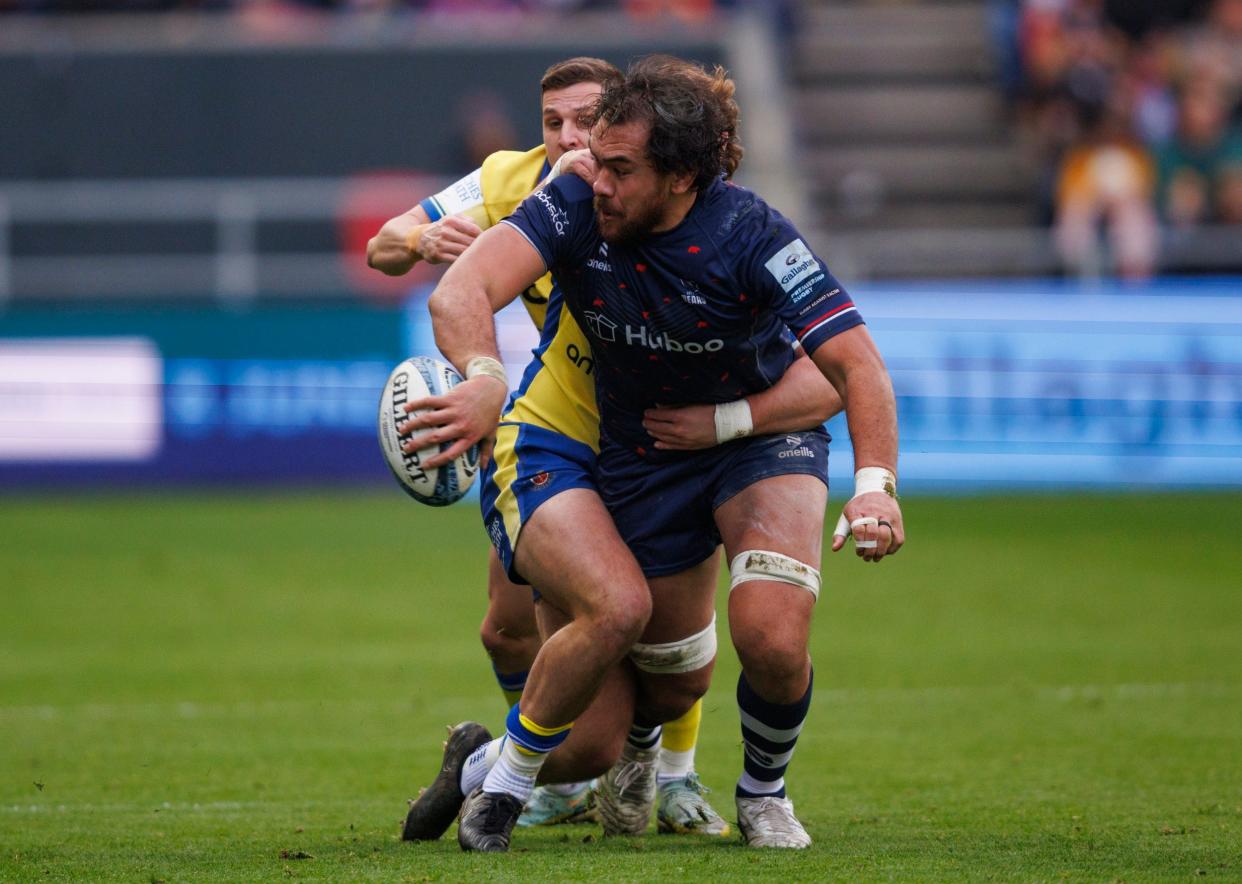
Lam opted against backing up AJ MacGinty with a more experienced fly-half upon Callum Sheedy’s departure. Instead, academy graduate Sam Worsley has come into the frame. James Williams, Max Malins and Benhard Janse van Rensburg are all auxiliary fly-halves. Having come from London Irish, Janse van Rensburg is said to be receiving about £240,000 a year, which represents fantastic value.
That is not to say that a slightly skinnier overall budget is without lucrative deals. Malins picks up £350,000, which is around the same figure that brought in Bill Mata from Edinburgh as Magnus Bradbury went in the opposite direction. Steven Luatua is still on over £300,000 after renewing last season.
MacGinty and Ellis Genge sit top of the structure. There are said to be on salaries in the region of £475,000. Both of them are in the third years of their current spells at Bristol, meaning they could be declared as exempt from the cap for 2024-25.
Hooker seems a focal point of ongoing negotiations with Harry Thacker and Gabriel Oghre among those out of contract. MacGinty is in the same boat, with Malins weighing up an option to stay, too.
Biggest strength: Strong and settled core suited to Lam’s style
Biggest headache on the horizon: Streamlined squad needs key men fit

Exeter Chiefs
Excluded player: Henry Slade
Leading a new defensive system, landing last-gasp kicks to win matches and providing a calm presence for greener colleagues around him; Henry Slade could have done little more to reinforce his importance to Exeter last season.
Appropriately, he was rewarded with a handsome extension worth around £480,000. It is a ‘one plus one’, which means the 31-year-old will be able to trigger a second year if he so wishes. A host of other renewals will keep Ross Vintcent, Scott Sio, Rus Tuima and Immanuel Feyi-Waboso in Devon for the foreseeable future.
There are senior figures such as Sio, Slade, Olly Woodburn, Jack Yeandle and Jacques Vermeulen, but “good talent on cheap coin” was how one source characterised Rob Baxter’s squad, and the link with Exeter University is a success story of the Premiership.
Deals that are “tied into the length of the course”, covering the costs of the degree “with a little cash”, are common for Chiefs’ student contingent – and beneficial for the club. Vintcent, who went from unknown to Italy international, exemplified remarkable bang for the buck last season. Paul Bampoe-Brown seems to be another gem on the wing.
Nika Abuladze was beginning to assert himself in January when an Achilles tendon injury derailed his campaign. Montpellier subsequently swooped for the Georgia loosehead prop, a mighty scrummager. Exeter reacted decisively, though, bringing in Will Goodrick-Clarke from Ealing Trailfinders and Kwenzo Blose from the Stormers. Those two will back up Sio.
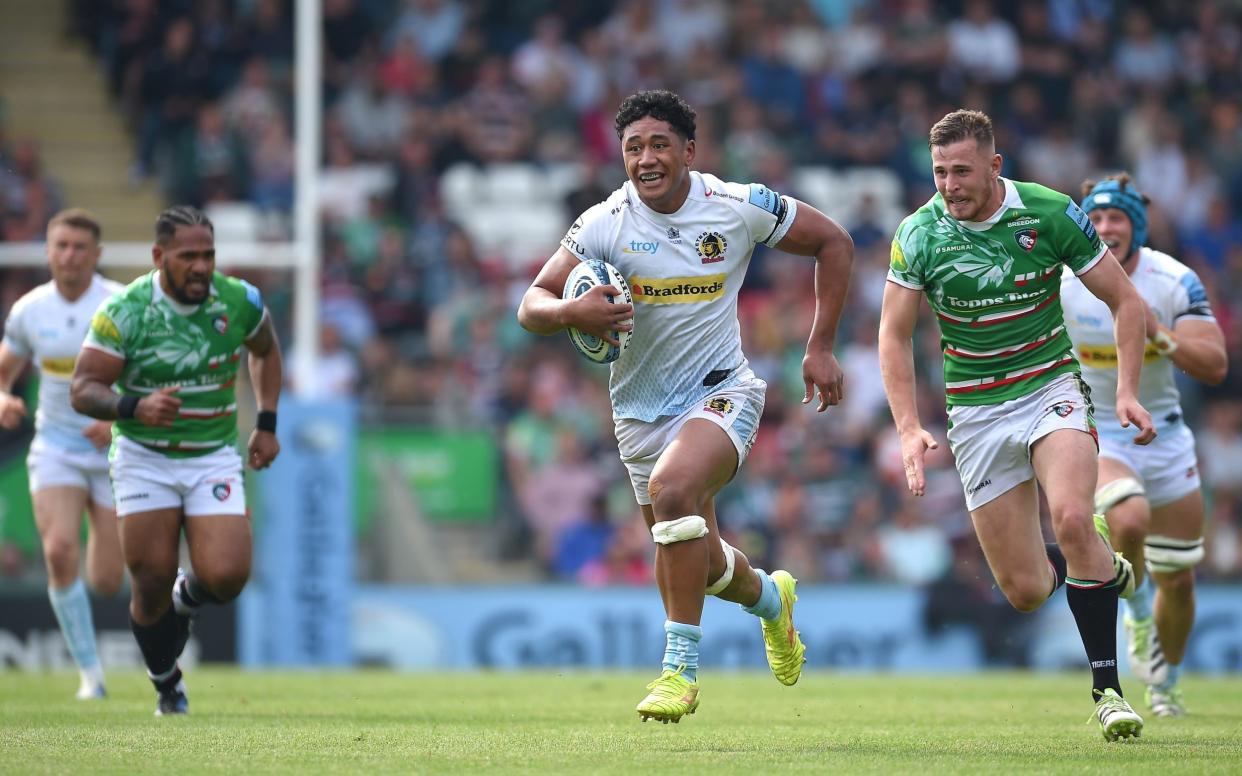
On the other side of the front row, Josh Iosefa-Scott, Ehren Painter and Marcus Street are said to be out of contract at the end of the upcoming campaign. Richard Capstick and Dan Frost are, too. The latter, an all-action hooker, has already attracted strong interest.
Having lost a group including Alec Hepburn, Jonny Gray and Ollie Devoto this summer, Exeter have headroom beneath the salary cap ceiling and could need it soon enough.
Greg Fisilau is thought to have earned around £70,000 last season as he emerged in a quietly assured manner, capping the season with a call-up to the England training squad. It is understood that the 21-year-old’s pay increases slightly for this term to around £100,000, but a significant jump could be needed for 2025-26. One source predicted that Fisilau could command £200,000 in the near future.
One advantage for Exeter, who also added centre Tamati Tua at relatively late notice, is that their director of rugby has built and rebuilt this side multiple times.
“He pays when he needs to pay,” an insider said of Baxter. “He pays well and he pays fair and he’s very smart with everything else.”
Biggest strength: Relentless production line, aided by Baxter’s nose for talent
Biggest headache on the horizon: Retaining youngsters as wages rise and suitors enquire

Gloucester
Possible excluded player: Zach Mercer
Tomos Williams and Gareth Anscombe headline George Skivington’s summer signings. Whenever a potentially first-choice half-back pairing is brought into a club, there is a sense that a line in the sand has been drawn.
Gloucester are evidently intent on halting a poor run in the Premiership that has seen them finish above only Newcastle in each of the past two seasons. Anscombe is a direct replacement for Adam Hastings, the Scotland fly-half who was continually frustrated by injuries. Billy Burns is thought to have been in the running for a return from Ulster before Anscombe, who has also endured long lay-offs, was settled upon.
Elsewhere, Christian Wade will be aiming to add to his dizzying domestic try tally. Recruiting him mitigates the departure of Louis Rees-Zammit, a fellow NFL convert, and Jonny May. Alfie Petch, a former England age-group tighthead prop, has been whisked back to these shores from Biarritz. Fraser Balmain was bought out of his contract by Saracens, meaning that Afolabi Fasogbon may have opportunities as well.
Zach Mercer is thought to be netting around £450,000 in what looks likely to be his last season before moving on, apparently to Toulon. He could be the club’s sole exempt player now, because Balmain and Hastings were big earners. Ruan Ackermann and Albert Tuisue are also towards the top of the wage bill, as will be Val Rapava Ruskin agreeing a “long-term” extension.
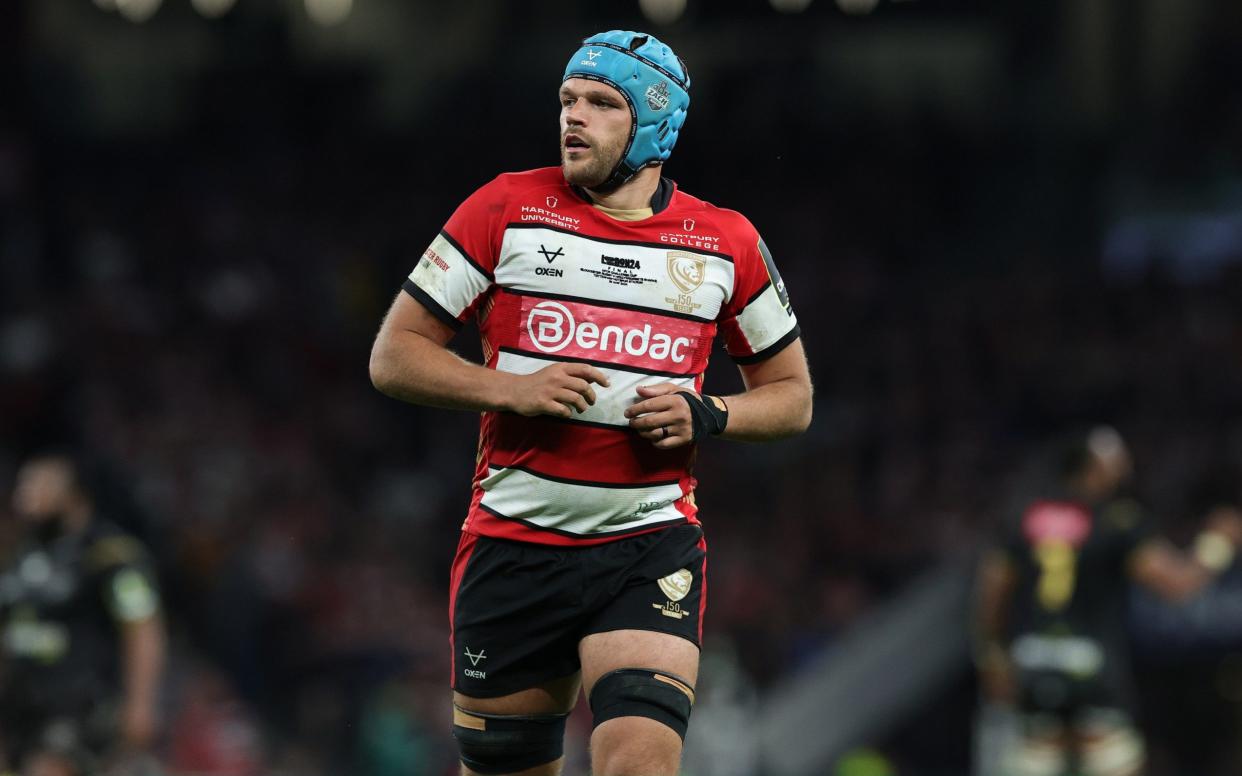
Despite a decent amount of turnover at Kingsholm, the balance of the squad attracted criticism from sources. It is thought that hookers George McGuigan and Jack Singleton are being paid wages of over £250,000 and that there are now four scrum-halves – Charlie Chapman, Caolan Englefield, Stephen Varney and Williams – on more than £100,000 per year. It seems unfeasible for that to continue into the 2025-26 campaign.
Tying down Matías Alemanno, Kiril Gotovtsev and Jack Clement felt important, but there is more work to do. It is understood that Seb Blake, Arthur Clark, Englefield and Seb Atkinson are all out of contract at the end of the season.
Englefield represented England A against Portugal in February with Clark part of preparations for the fixture. Blake, excellent last term, and Atkinson have steadily asserted themselves in the Gloucester side. Early offers are thought to be in, but all of these talented youngsters have interest elsewhere.
On a more optimistic note, Tom Pearson is thought to be a target for the Cherry and Whites.
Biggest strength: Direction from cohesive new half-backs
Biggest headache on the horizon: Keeping hold of prospects while rebalancing scrum-half and hooker
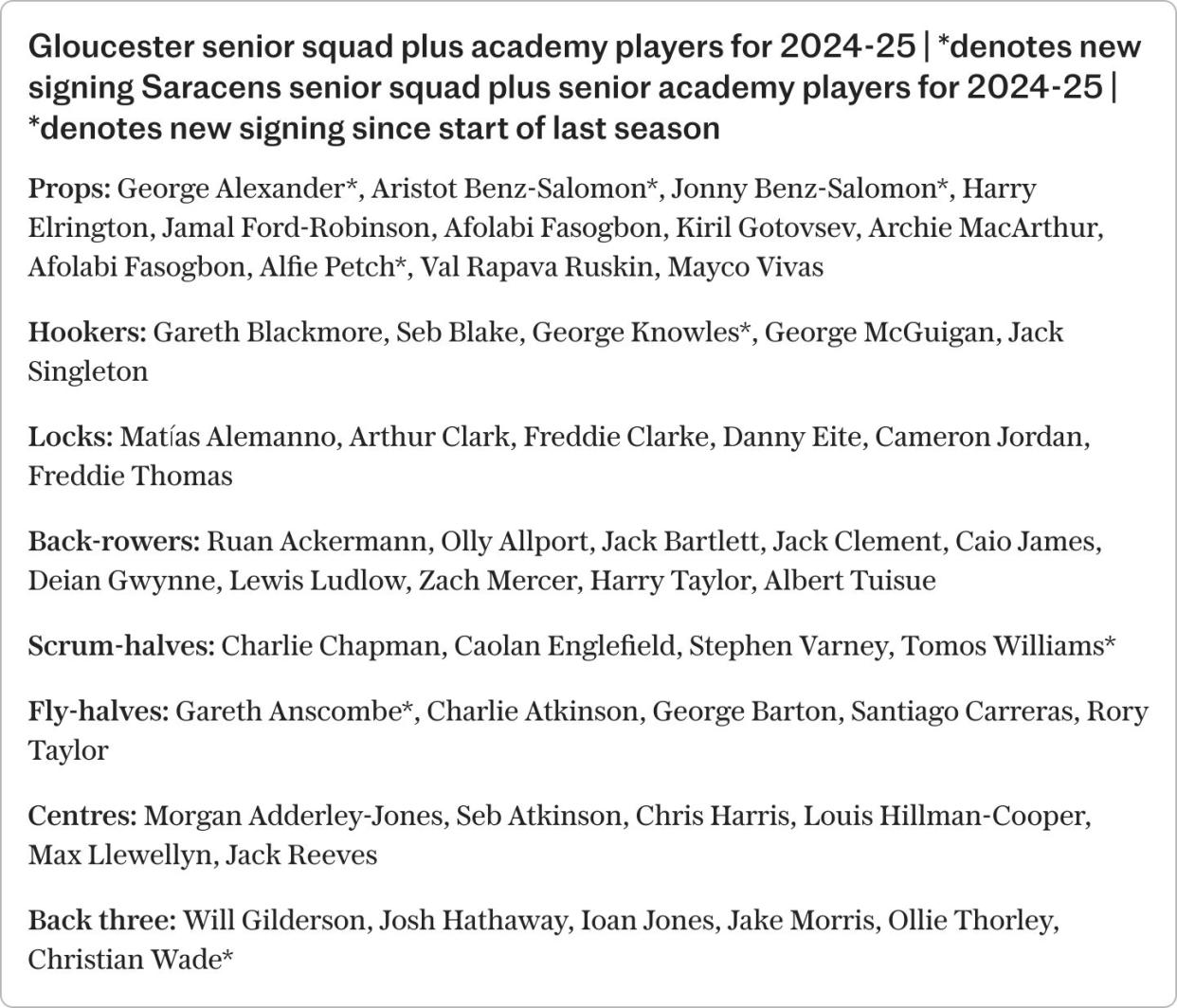
Harlequins
Probable excluded player: Marcus Smith
Scrum-half is a fitting place to begin for Harlequins, with Danny Care expected by various sources to retire at the end of the coming season. The 37-year-old-year-old is thought to have an option to prolong his current deal, however, if he fancies a crack at the 2025-26 campaign as well.
With that backdrop, Will Porter has a significant period ahead. The former Wasp reinforced his class during what was perhaps Harlequins’ best win of last season, the thrilling victory over Bordeaux-Bègles at Stade Chaban-Dalmas in the Champions Cup quarter-final. He is out of contract at the end of the season. By that stage, Porter could be Harlequins’ conclusive number one scrum-half, or he could have been snapped up by a rival.
Further down the pecking order, Lucas Friday is rated extremely highly. Skilful and tidy, he came off the bench for England U20 in the World Championship final against France this summer and, having just turned 18, is earmarked for big things.
Speaking of big things, Chandler Cunningham-South, who arrived on injury dispensation when London Irish went under, is now set to stay until 2026.
Reflecting on Harlequins’ key departures this summer, they clearly felt covered in the back three. Louis Lynagh, understood to have received close to £120,000 in his last year, improved that to around £240,000 upon agreeing terms with Benetton. The latter is obviously more destination for his budding Italy career.
Ed Spokes, the club’s head of recruitment, has not attempted to source a direct replacement for André Esterhuizen. Lennox Anyanwu, Bryn Bradley and Luke Northmore would appear to be in contention to succeed the Springbok in the inside centre role.
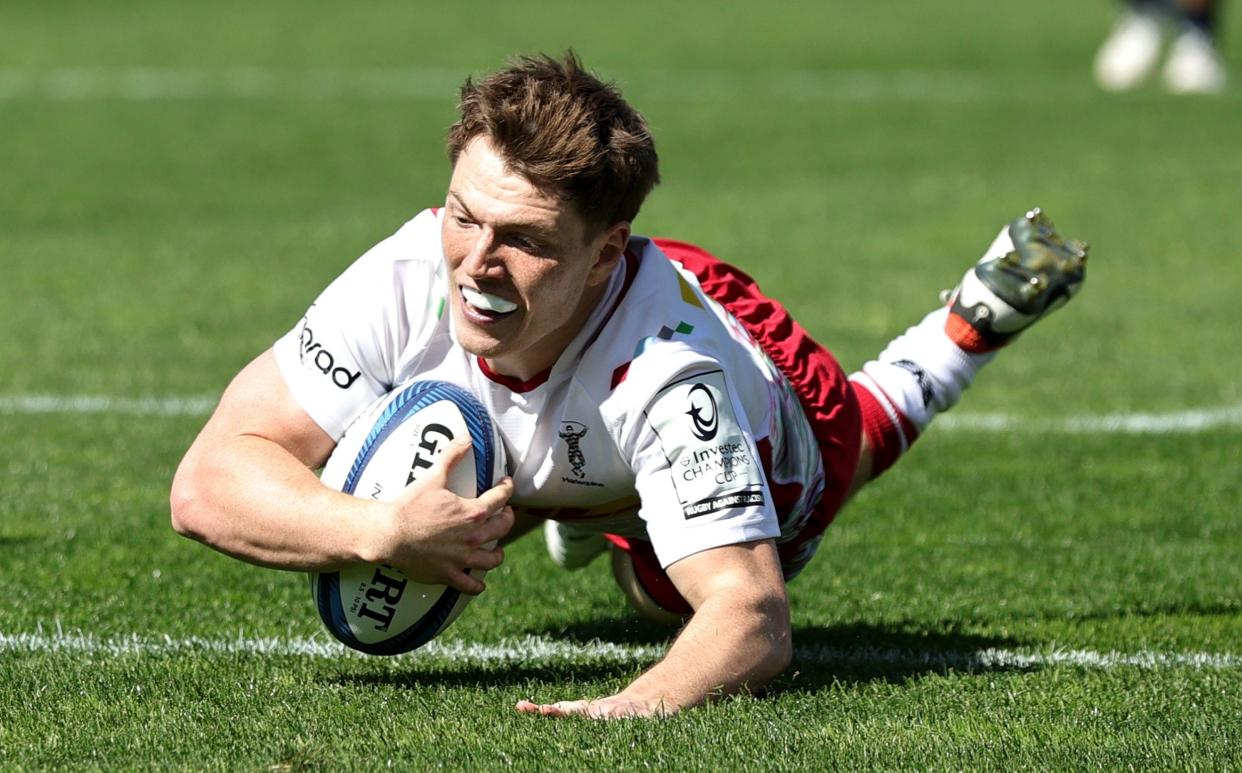
Titi Lamositele, the former Saracen and USA international who has joined from Montpellier on £250,000 or just over, represents a bid to mitigate for Will Collier’s exit. Despite also losing Lovejoy Chawatama this summer and Wilco Louw a year ago, scrum coach Adam Jones still has a strong stable of props to work with – not least Wyn Jones, in for Joe Marler as injury cover.
There could well be changes at lock, with Joe Launchbury and Stephan Lewies among those out of contract. They are aged 33 and 32, respectively, with Irné Herbst at 31.
Careful thought will be given to the cultivating the squad. Jarrod Evans, deputy to Marcus Smith at fly-half, is up for renewal, as are Nathan Jibulu and Sam Riley, two dynamic young hookers, rapid wing Cassius Cleaves, busy back-rower Will Trenholm and Anyanwu.
Finally, as veteran Leigh Halfpenny arrives as injury cover for Cadan Murley, fizzing full-back Tyrone Green is also out of contract.
Biggest strength: Definitive style led by Marcus Smith and underpinned by scrummaging pedigree
Biggest headache on the horizon: How much Esterhuizen and Collier could be missed

Article courtesy of
Source link